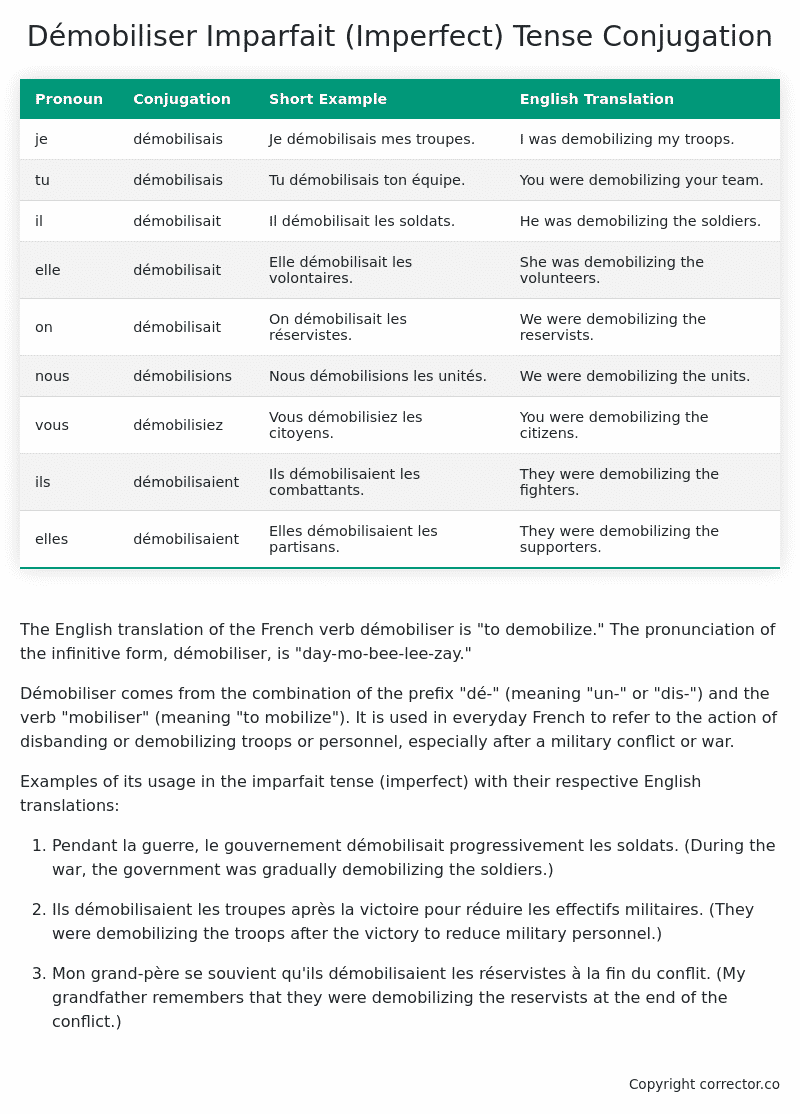Imparfait (Imperfect) Tense Conjugation of the French Verb démobiliser
Introduction to the verb démobiliser
The English translation of the French verb démobiliser is “to demobilize.” The pronunciation of the infinitive form, démobiliser, is “day-mo-bee-lee-zay.”
Démobiliser comes from the combination of the prefix “dé-” (meaning “un-” or “dis-“) and the verb “mobiliser” (meaning “to mobilize”). It is used in everyday French to refer to the action of disbanding or demobilizing troops or personnel, especially after a military conflict or war.
Examples of its usage in the imparfait tense (imperfect) with their respective English translations:
-
Pendant la guerre, le gouvernement démobilisait progressivement les soldats.
(During the war, the government was gradually demobilizing the soldiers.) -
Ils démobilisaient les troupes après la victoire pour réduire les effectifs militaires.
(They were demobilizing the troops after the victory to reduce military personnel.) -
Mon grand-père se souvient qu’ils démobilisaient les réservistes à la fin du conflit.
(My grandfather remembers that they were demobilizing the reservists at the end of the conflict.)
Table of the Imparfait (Imperfect) Tense Conjugation of démobiliser
| Pronoun | Conjugation | Short Example | English Translation |
|---|---|---|---|
| je | démobilisais | Je démobilisais mes troupes. | I was demobilizing my troops. |
| tu | démobilisais | Tu démobilisais ton équipe. | You were demobilizing your team. |
| il | démobilisait | Il démobilisait les soldats. | He was demobilizing the soldiers. |
| elle | démobilisait | Elle démobilisait les volontaires. | She was demobilizing the volunteers. |
| on | démobilisait | On démobilisait les réservistes. | We were demobilizing the reservists. |
| nous | démobilisions | Nous démobilisions les unités. | We were demobilizing the units. |
| vous | démobilisiez | Vous démobilisiez les citoyens. | You were demobilizing the citizens. |
| ils | démobilisaient | Ils démobilisaient les combattants. | They were demobilizing the fighters. |
| elles | démobilisaient | Elles démobilisaient les partisans. | They were demobilizing the supporters. |
Other Conjugations for Démobiliser.
Le Present (Present Tense) Conjugation of the French Verb démobiliser
Imparfait (Imperfect) Tense Conjugation of the French Verb démobiliser (You’re reading it right now!)
Passé Simple (Simple Past) Tense Conjugation of the French Verb démobiliser
Passé Composé (Present Perfect) Tense Conjugation of the French Verb démobiliser
Futur Simple (Simple Future) Tense Conjugation of the French Verb démobiliser
Futur Proche (Near Future) Tense Conjugation of the French Verb démobiliser
Plus-que-parfait (Pluperfect) Tense Conjugation of the French Verb démobiliser
Passé Antérieur (Past Anterior) Tense Conjugation of the French Verb démobiliser
Futur Antérieur (Future Anterior) Tense Conjugation of the French Verb démobiliser
Subjonctif Présent (Subjunctive Present) Tense Conjugation of the French Verb démobiliser
Subjonctif Passé (Subjunctive Past) Tense Conjugation of the French Verb démobiliser
Subjonctif Imparfait (Subjunctive Imperfect) Tense Conjugation of the French Verb démobiliser
Conditionnel Présent (Conditional Present) Tense Conjugation of the French Verb démobiliser
Conditionnel Passé (Conditional Past) Tense Conjugation of the French Verb démobiliser
Conditionnel Passé II (Conditional Past II) Tense Conjugation of the French Verb démobiliser
L’impératif Présent (Imperative Present) Tense Conjugation of the French Verb démobiliser
L’impératif Passé (Imperative Past) Tense Conjugation of the French Verb démobiliser
L’infinitif Présent (Infinitive Present) Tense Conjugation of the French Verb démobiliser
L’infinitif Passé (Infinitive Past) Tense Conjugation of the French Verb démobiliser
Le Participe Présent (Present Participle) Tense Conjugation of the French Verb démobiliser
Le Participe Passé (Past Participle) Tense Conjugation of the French Verb démobiliser
Struggling with French verbs or the language in general? Why not use our free French Grammar Checker – no registration required!
Get a FREE Download Study Sheet of this Conjugation 🔥
Simply right click the image below, click “save image” and get your free reference for the démobiliser imparfait tense conjugation!

Démobiliser – About the French Imparfait Tense
NOTE: To take a deep dive into all the French tenses then see our article on Mastering French Tense Conjugation.
Formation of the Imparfait Tense
For regular -er verbs:
For regular -ir verbs
For regular -re verbs
Common Everyday Usage Patterns
Description of Past Habits
Background Information
Mental and Emotional States
It’s employed to express emotions, thoughts, or physical sensations in the past. For example: “J’étais content quand il est arrivé.” (I was happy when he arrived.)
Ongoing Actions
Points to Note About the Imparfait Tense
Passé Composé vs. Imparfait
Conditional
Si Clauses
Narration
I hope you enjoyed this article on the verb démobiliser. Still in a learning mood? Check out another TOTALLY random French verb imparfait conjugation!


